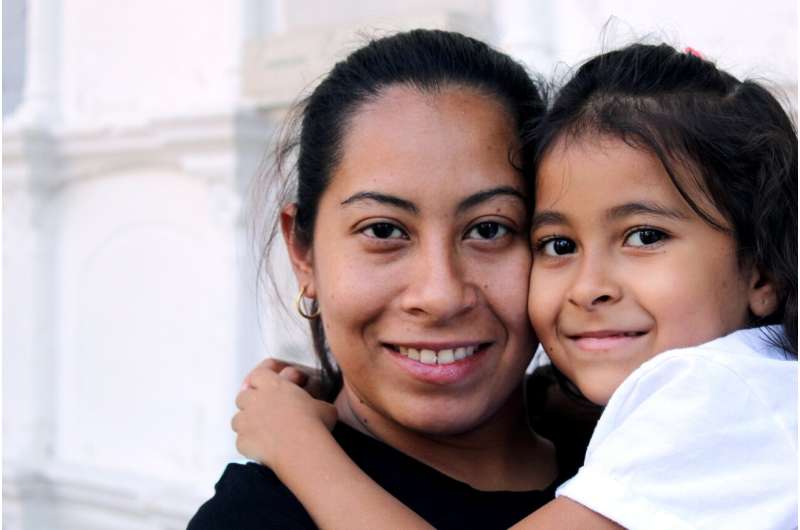COVID increased Latinas' responsibilities at home while limiting their ability to work: Report

During the COVID-19 pandemic, Latinas left their jobs in large numbers as they were forced to shoulder an unequal share of household and child care responsibilities, and most haven't reentered the workforce despite an economic rebound, according to a report published today by the UCLA Latino Policy and Politics Institute.
Predicted to be the fastest growing segment of the U.S. labor force before the pandemic, Latinas were more likely than women and men from all other demographic groups to drop out of the workforce at the height of the crisis, often to take on unpaid work at home. By August 2022, the percentage of Latinas not working paid jobs as a result of household responsibilities remained the same as it was in August 2020.
"Latinas are integral to a prosperous future for America, but this analysis makes clear that they remain in an economically precarious position due to cultural and societal pressures to be their households' primary caregivers," said Sonja Diaz, director of the institute. "Latina participation in the labor force continues to lag below pre-pandemic levels, and this can only be repaired through targeted programs that support women who serve as both workers in our economy and caregivers in the home."
Using data from the U.S Bureau of Labor Statistics' American Time Use Survey and the U.S. Census Bureau's Household Pulse Survey, researchers tracked the amount of time Latinas spent on household work and care between 2019 and 2022 and how their expanded responsibilities affected their employment status.
Like many women, Latinas often assume the role of household managers, family caretakers and mothers, in addition to being employees. But as stay-at-home orders were instituted and schools and day care centers closed in 2020, a far greater proportion of Latinas left the workforce to attend to increased domestic responsibilities than women overall. And significantly, the researchers found, the time Latinas spend working in the household still has not returned pre-pandemic levels, indicating that certain relief and support systems that have contributed to economic recovery for other women have not always equitably benefited Latinas.
Between 2019 and 2020, the average time Latinas spent caring for children, elders and other family members each day increased by 30%, while Latino men's caregiving time fell by 25%, suggesting that when Latino families were faced with COVID-19–related caretaking challenges, it was women rather than men who were forced to choose between unpaid work at home and their careers.
In addition to certain cultural expectations within Latino households, the analysis attributes the increase in Latinas' domestic responsibilities and disproportionate exit from the workforce to several factors. First, Latinas, who are younger on average than their white counterparts, were more likely to have at least one child at home in 2020 (60%) than white women (32%). By August 2022, 32% of non-employed Latinas reported that they had left a job due to child care issues, compared with 20% of all women. Second, Latinas generally lacked access to jobs that could be done from home, making them the group of women least likely to have worked remotely in 2020 and 2021.
"Latinas are not just the backbone of their families, they are essential to the American economy," said report co-author Misael Galdámez, a research analyst with the institute. "It is imperative we invest in support systems for Latinas that enable them to reenter the workforce and alleviate the sense of obligation they have to take on unpaid responsibilities over paid work."
The report suggests meaningful ways to bring Latinas back into the workforce that enable them to reap the benefits of economic recovery through initiatives that boost financial stability and child care availability. These include:
- Providing state and federal child care subsidies and improving access to affordable child care.
- Expanding the earned-income tax credit.
- Strengthening programs to up-skill working Latinas.
- Establishing paid family and medical leave programs.
- Compensating family caregivers for the work they do in the household.
- Retooling unemployment insurance to include part-time workers providing care to families.
"This pandemic has given us the opportunity to learn how to better support our most vulnerable workers in a crisis," said Gabriella Carmona, a research analyst at the center and co-author of the report. "We must invest in the infrastructure that prevents working women from having to make costly work–family decisions. This means making high-quality, flexible jobs more accessible while compensating unpaid caregivers for the value their household labor produces. Policies such as these would give Latinas and workers more generally genuine autonomy in their careers and family decisions."
More information: Report: latino.ucla.edu/research/latina-care-work-covid19/
Provided by University of California, Los Angeles




















